英语人称代词的用法
- 格式:doc
- 大小:57.00 KB
- 文档页数:13
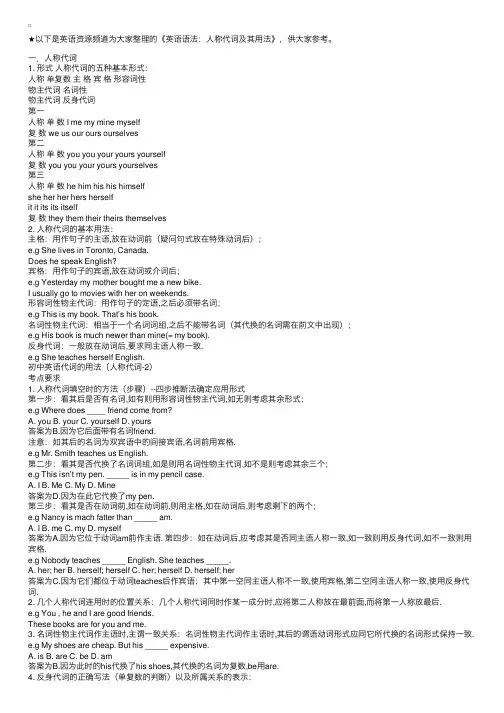
★以下是英语资源频道为⼤家整理的《英语语法:⼈称代词及其⽤法》,供⼤家参考。
⼀.⼈称代词1. 形式⼈称代词的五种基本形式:⼈称单复数主格宾格形容词性物主代词名词性物主代词反⾝代词第⼀⼈称单数 I me my mine myself复数 we us our ours ourselves第⼆⼈称单数 you you your yours yourself复数 you you your yours yourselves第三⼈称单数 he him his his himselfshe her her hers herselfit it its its itself复数 they them their theirs themselves2. ⼈称代词的基本⽤法:主格:⽤作句⼦的主语,放在动词前(疑问句式放在特殊动词后);e.g She lives in Toronto, Canada.Does he speak English?宾格:⽤作句⼦的宾语,放在动词或介词后;e.g Yesterday my mother bought me a new bike.I usually go to movies with her on weekends.形容词性物主代词:⽤作句⼦的定语,之后必须带名词;e.g This is my book. That’s his book.名词性物主代词:相当于⼀个名词词组,之后不能带名词(其代换的名词需在前⽂中出现);e.g His book is much newer than mine(= my book).反⾝代词:⼀般放在动词后,要求同主语⼈称⼀致.e.g She teaches herself English.初中英语代词的⽤法(⼈称代词-2)考点要求1. ⼈称代词填空时的⽅法(步骤)--四步推断法确定应⽤形式第⼀步:看其后是否有名词,如有则⽤形容词性物主代词,如⽆则考虑其余形式;e.g Where does ____ friend come from?A. youB. yourC. yourselfD. yours答案为B.因为它后⾯带有名词friend.注意:如其后的名词为双宾语中的间接宾语,名词前⽤宾格.e.g Mr. Smith teaches us English.第⼆步:看其是否代换了名词词组,如是则⽤名词性物主代词,如不是则考虑其余三个;e.g This isn’t my pen. _____ is in my pencil case.A. IB. MeC. MyD. Mine答案为D.因为在此它代换了my pen.第三步:看其是否在动词前,如在动词前,则⽤主格,如在动词后,则考虑剩下的两个;e.g Nancy is mach fatter than _____ am.A. IB. meC. myD. myself答案为A.因为它位于动词am前作主语. 第四步:如在动词后,应考虑其是否同主语⼈称⼀致,如⼀致则⽤反⾝代词,如不⼀致则⽤宾格.e.g Nobody teaches _____ English. She teaches _____.A. her; herB. herself; herselfC. her; herselfD. herself; her答案为C.因为它们都位于动词teaches后作宾语;其中第⼀空同主语⼈称不⼀致,使⽤宾格,第⼆空同主语⼈称⼀致,使⽤反⾝代词.2. ⼏个⼈称代词连⽤时的位置关系:⼏个⼈称代词同时作某⼀成分时,应将第⼆⼈称放在最前⾯,⽽将第⼀⼈称放最后.e.g You , he and I are good friends.These books are for you and me.3. 名词性物主代词作主语时,主谓⼀致关系:名词性物主代词作主语时,其后的谓语动词形式应同它所代换的名词形式保持⼀致.e.g My shoes are cheap. But his _____ expensive.A. isB. areC. beD. am答案为B.因为此时的his代换了his shoes,其代换的名词为复数,be⽤are.4. 反⾝代词的正确写法(单复数的判断)以及所属关系的表⽰:(1)在使⽤反⾝代词时,应注意根据句中的某些词语推断其单复数形式,并注意其正确写法.e.g Please help _____ to some cakes, children.A. youB. yourselfC. yourselvesD. your答案为C.因为“help yourself to some…”是⼀个固定句式(意为“请随便吃点……”),我们可根据children认定对象为复数.(2)在说明“某⼈⾃⼰的”时,不能⽤反⾝代词加所有格符号表⽰,⽽应⽤“形容词性物主代词+own+名词”表⽰.e.g 错:He drove himself’s car to go camping last Sunday.对:He drove his own car to go camping last Sunday.5. 双重所有格的使⽤:在“数词+名词+of+⼈称代词”这样的词组中,⼈称代词应使⽤名词性物主代词,同of⼀起构成双重所有格形式.e.g 错:Lucy is a good friend of me.对:Lucy is a good friend of mine.⼆、复合不定代词由some; any; no; every和body; thing; one构成的合成词考点要求1. ⾃⾝的意义以及对句式的要求:构成复合不定代词的两个部分分别表⽰不同的意义和对句式的要求以及考虑其表⼈还是表物.body⽤来表⼈;thing⽤来表物;one既可表⼈也可表物.some表⽰“某”,⽤于肯定陈述句或⽤情态动词引导的问句中;any表⽰“某”,⽤于否定句或问句;no表⽰“没有”,⽤于肯定句说明否定意义;every表⽰“每⼀”,⽤于肯定句或问句.2. 主谓⼀致性关系:复合不定代词任何时候都看为单数,作主语时,谓语动词使⽤第三⼈称单数形式.e.g 错:Everybody in our class are interested in English.对:Everybody in our class is interested in English.3. 定语后置关系:对复合不定代词进⾏修饰的词语必须后置放在它的后⾯.e.g 错:I have important something to tell you.对:I have something important to tell you.4. none和其它复合不定代词的⽤法区别:none在句中不能单独作主语,但可同of连⽤带名词⼀起作主语;其它复合不定代词可单独作主语,但不能同of连⽤.e.g 错:He is new here, so none knows him.对:He is new here, so no one knows him.错:Nobody of them has been to England before.对:None of them has been to England before..5. 代换复合不定代词的⼈称代词:在使⽤⼈称代词代换复合不定代词时,应考虑其表⼈还是表物,表⼈时,⽤they代换,表物时,⽤it 代换.e.g Something is wrong with your computer, isn’t it?Nobody has been there before, have they?。
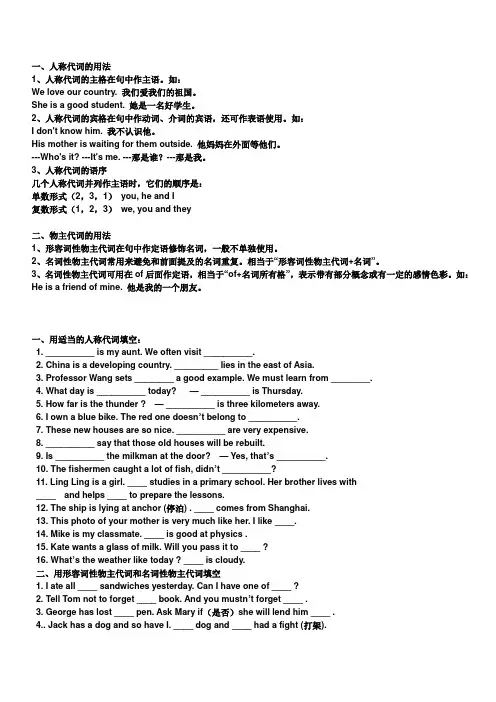
一、人称代词的用法1、人称代词的主格在句中作主语。
如:We love our country. 我们爱我们的祖国。
She is a good student. 她是一名好学生。
2、人称代词的宾格在句中作动词、介词的宾语,还可作表语使用。
如:I don't know him. 我不认识他。
His mother is waiting for them outside. 他妈妈在外面等他们。
---Who's it? ---It's me. ---那是谁?---那是我。
3、人称代词的语序几个人称代词并列作主语时,它们的顺序是:单数形式(2,3,1)you, he and I复数形式(1,2,3)we, you and they二、物主代词的用法1、形容词性物主代词在句中作定语修饰名词,一般不单独使用。
2、名词性物主代词常用来避免和前面提及的名词重复。
相当于“形容词性物主代词+名词”。
3、名词性物主代词可用在of后面作定语,相当于“of+名词所有格”,表示带有部分概念或有一定的感情色彩。
如:He is a friend of mine. 他是我的一个朋友。
一、用适当的人称代词填空:1. __________ is my aunt. We often visit __________.2. China is a developing country. _________ lies in the east of Asia.3. Professor Wang sets ________ a good example. We must learn from ________.4. What day is __________ today? — __________ is Thursday.5. How far is the thunder ? — __________ is three kilometers away.6. I own a blue bike. The red one doesn’t belong to __________.7. These new houses are so nice. __________ are very expensive.8. __________ say that those old houses will be rebuilt.9. Is __________ the milkman at the door? — Yes, that’s __________.10. The fishermen caught a lot of fish, didn’t __________?11. Ling Ling is a girl. ____ studies in a primary school. Her brother lives with____ and helps ____ to prepare the lessons.12. The ship is lying at anchor (停泊) . ____ comes from Shanghai.13. This photo of your mother is very much like her. I like ____.14. Mike is my classmate. ____ is good at physics .15. Kate wants a glass of milk. Will you pass it to ____ ?16. What’s the weather like today ? ____ is cloudy.二、用形容词性物主代词和名词性物主代词填空1. I ate all ____ sandwiches yesterday. Can I have one of ____ ?2. Tell Tom not to forget ____ book. And you mustn’t forget ____ .3. George has lost ____ pen. Ask Mary if(是否)she will lend him ____ .4.. Jack has a dog and so have I. ____ dog and ____ had a fight (打架).5. The teacher wants you to return that book of ____6. Mr. and Mrs. Green and a friend of ____ are coming to see us.7. Mary wants to know if(是否)you’ve seen a pair of gloves of ____ .8. We are going to Paris to stay with a French friend of ____ .三、用适当的人称代词和物主代词填空A. 从括号内选择正确的代词填空1. Your football clothes are on the desk.Please put _________(they,them,their,theirs) away.2. (We,Us,Our,Ours)_________ English teacher is Mrs. Green.We all like _________(she,her,hers).3. (I,Me,My,Mine)_________ can’t get my kite.Could you help _________(I,me,my,mine)?4. Tom can’t get down from the tree.Can you help _________(he,him,his)?5. Her kite is broken. Can _________(you,your,yours) mend it?6. We can’t find our bikes.Can you help _________(we,us,our,ours)?7. These are _________(he,him,his) planes.The white ones are _________(I,me,mine).B. 填入正确的人称代词和物主代词1. This isn’t her knife. _________ is green.2. These are your books,Kate. Put __________ in the desk,please.3. You must look after ________ things.4. Wei Fang,is that ________ ruler? Yes,it’s.5. They want a football. Give __________ the green one,please.6. It’s Lin Tao’s bag. Give ________ to __________.7. Is this pencil-box Li Lei’s? No,___________ is very new.8. This box is too heavy. I can’t carry _________.Don’t worry,Let __________ help __________.9. _____ is a boy _____ name is Mike. Mike’s friends like _____ very much.10. My sister is in _____ room. _____ is a teacher.11. Jane is a little girl. _____ mother is a nurse.12. We are in _____ classroom. _____ classroom is big.13. My father and mother are teachers. _____ are busy14. You are a pupil. Is _____ brother a pupil, too?四、用括号中的适当形式填空A)(1)Are these ________(you)pencils?Yes, they are ________(our).(2)—Whose is this pencil?—It’s ________(I).(3)I love ________(they)very much.(4)She is________(I)classmate.(5)Miss Li often looks after________(she)brother.(6)—Are these ________(they)bags ?—No, they aren’t ________(their). They are ________(we).B)1. This bike is my sister`s. It belongs to ______ (她的)。
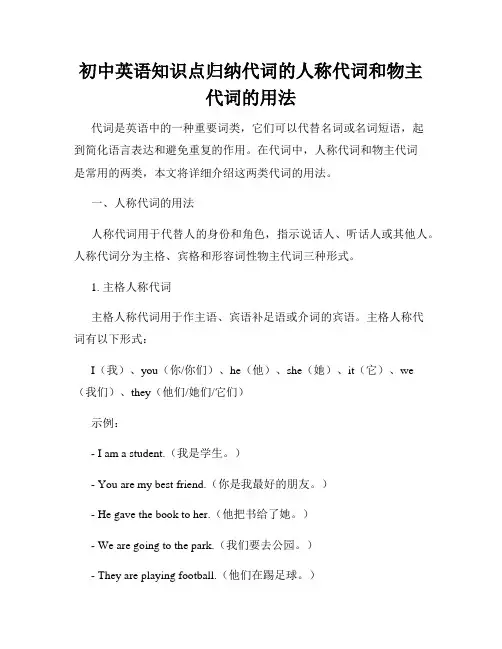
初中英语知识点归纳代词的人称代词和物主代词的用法代词是英语中的一种重要词类,它们可以代替名词或名词短语,起到简化语言表达和避免重复的作用。
在代词中,人称代词和物主代词是常用的两类,本文将详细介绍这两类代词的用法。
一、人称代词的用法人称代词用于代替人的身份和角色,指示说话人、听话人或其他人。
人称代词分为主格、宾格和形容词性物主代词三种形式。
1. 主格人称代词主格人称代词用于作主语、宾语补足语或介词的宾语。
主格人称代词有以下形式:I(我)、you(你/你们)、he(他)、she(她)、it(它)、we(我们)、they(他们/她们/它们)示例:- I am a student.(我是学生。
)- You are my best friend.(你是我最好的朋友。
)- He gave the book to her.(他把书给了她。
)- We are going to the park.(我们要去公园。
)- They are playing football.(他们在踢足球。
)2. 宾格人称代词宾格人称代词用于作动词或介词的宾语。
宾格人称代词有以下形式:Me(我)、you(你/你们)、him(他)、her(她)、it(它)、us(我们)、them(他们/她们/它们)示例:- Lisa called me yesterday.(丽莎昨天给我打电话了。
)- Can you help him with his homework?(你能帮他做作业吗?)- I saw her at the park.(我在公园看到了她。
)- It is for us.(这是给我们的。
)- They invited them to the party.(他们邀请了他们来参加聚会。
)3. 形容词性物主代词形容词性物主代词用于表示所属关系,修饰名词。
形容词性物主代词有以下形式:My(我的)、your(你的)、his(他的)、her(她的)、its(它的)、our(我们的)、their(他们的/她们的/它们的)示例:- This is my book.(这是我的书。
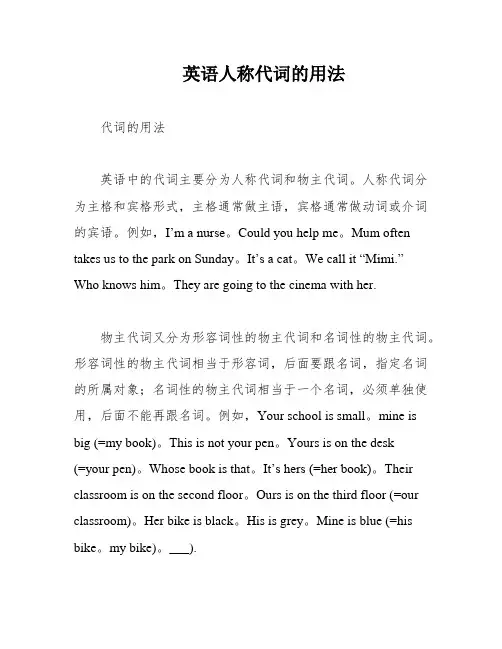
英语人称代词的用法代词的用法英语中的代词主要分为人称代词和物主代词。
人称代词分为主格和宾格形式,主格通常做主语,宾格通常做动词或介词的宾语。
例如,I’m a nurse。
Could you help me。
Mum often takes us to the park on Sunday。
It’s a cat。
We call it “Mimi.”Who knows him。
They are going to the cinema with her.物主代词又分为形容词性的物主代词和名词性的物主代词。
形容词性的物主代词相当于形容词,后面要跟名词,指定名词的所属对象;名词性的物主代词相当于一个名词,必须单独使用,后面不能再跟名词。
例如,Your school is small。
mine is big (=my book)。
This is not your pen。
Yours is on the desk(=your pen)。
Whose book is that。
It’s hers (=her book)。
Their classroom is on the second floor。
Ours is on the third floor (=our classroom)。
Her bike is black。
His is grey。
Mine is blue (=his bike。
my bike)。
___).在使用代词时,常用who(宾格可用whom)提问人称代词,常用whose提问物主代词。
1.I am a monkey。
Do you like it?My name is Gogo。
This house is ours。
2.The teacher asked me some ns。
but I can't answer。
3.The girl is from Canada。
Her name is Betty。
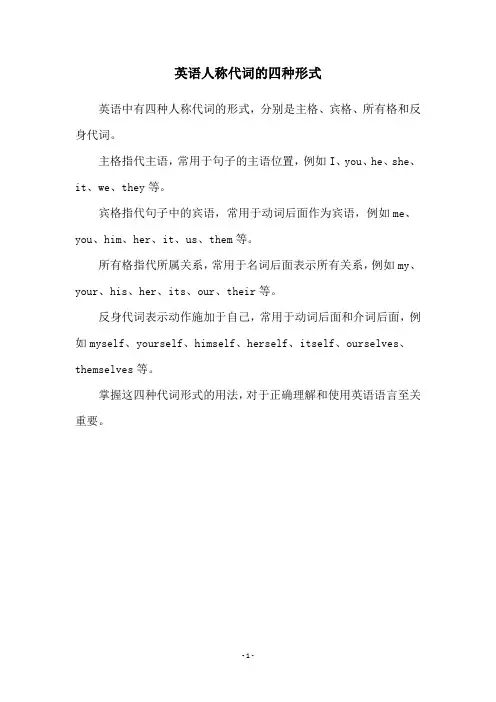
英语人称代词的四种形式
英语中有四种人称代词的形式,分别是主格、宾格、所有格和反身代词。
主格指代主语,常用于句子的主语位置,例如I、you、he、she、it、we、they等。
宾格指代句子中的宾语,常用于动词后面作为宾语,例如me、you、him、her、it、us、them等。
所有格指代所属关系,常用于名词后面表示所有关系,例如my、your、his、her、its、our、their等。
反身代词表示动作施加于自己,常用于动词后面和介词后面,例如myself、yourself、himself、herself、itself、ourselves、themselves等。
掌握这四种代词形式的用法,对于正确理解和使用英语语言至关重要。
- 1 -。
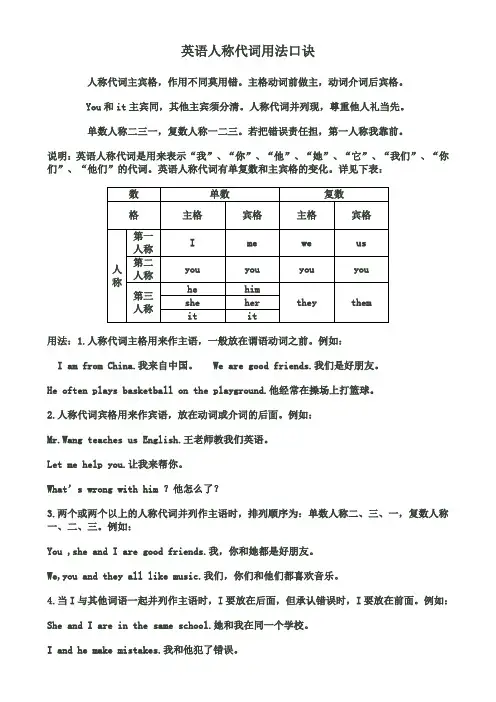
英语人称代词用法口诀人称代词主宾格,作用不同莫用错。
主格动词前做主,动词介词后宾格。
You和it主宾同,其他主宾须分清。
人称代词并列现,尊重他人礼当先。
单数人称二三一,复数人称一二三。
若把错误责任担,第一人称我靠前。
说明:英语人称代词是用来表示“我”、“你”、“他”、“她”、“它”、“我们”、“你们”、“他们”的代词。
英语人称代词有单复数和主宾格的变化。
详见下表:用法:1.人称代词主格用来作主语,一般放在谓语动词之前。
例如:I am from China.我来自中国。
We are good friends.我们是好朋友。
He often plays basketball on the playground.他经常在操场上打篮球。
2.人称代词宾格用来作宾语,放在动词或介词的后面。
例如:Mr.Wang teaches us English.王老师教我们英语。
Let me help you.让我来帮你。
What’s wrong with him?他怎么了?3.两个或两个以上的人称代词并列作主语时,排列顺序为:单数人称二、三、一,复数人称一、二、三。
例如:You ,she and I are good friends.我,你和她都是好朋友。
We,you and they all like music.我们,你们和他们都喜欢音乐。
4.当I与其他词语一起并列作主语时,I要放在后面,但承认错误时,I要放在前面。
例如:She and I are in the same school.她和我在同一个学校。
I and he make mistakes.我和他犯了错误。
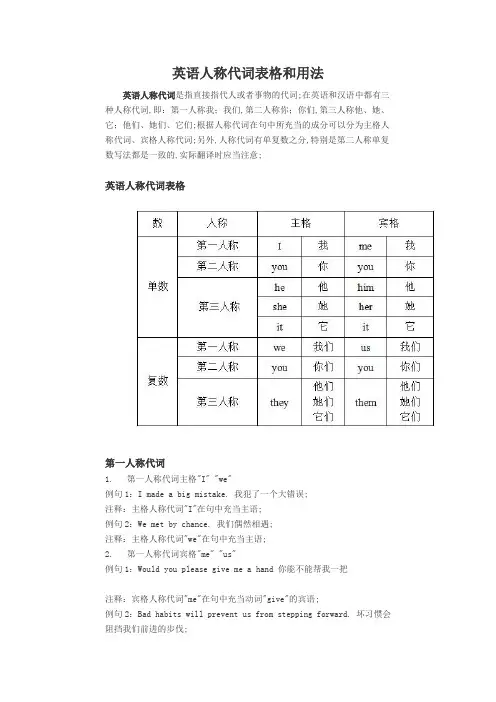
英语人称代词表格和用法英语人称代词是指直接指代人或者事物的代词;在英语和汉语中都有三种人称代词,即:第一人称我;我们,第二人称你;你们,第三人称他、她、它;他们、她们、它们;根据人称代词在句中所充当的成分可以分为主格人称代词、宾格人称代词;另外,人称代词有单复数之分,特别是第二人称单复数写法都是一致的,实际翻译时应当注意;英语人称代词表格第一人称代词1. 第一人称代词主格"I" "we"例句1:I made a big mistake. 我犯了一个大错误;注释:主格人称代词"I"在句中充当主语;例句2:We met by chance. 我们偶然相遇;注释:主格人称代词"we"在句中充当主语;2. 第一人称代词宾格"me" "us"例句1:Would you please give me a hand 你能不能帮我一把注释:宾格人称代词"me"在句中充当动词"give"的宾语;例句2:Bad habits will prevent us from stepping forward. 坏习惯会阻挡我们前进的步伐;注释:宾格人称代词"us"在句中充当动词"prevent"的宾语;第二人称代词1. 第二人称代词主格"you"你, "you"你们例句1:You have a natural gift for math. 你很有数学天赋;注释:第二人称代词主格"you"在句中充当主语;例句2:You are all good students. 你们都是好学生;注释:第二人称代词主格"you"在句中充当主语;本句话是复数,指代"你们";2. 第二人称代词宾格"you"你, "you"你们例句1:I must thank you for your generosity and charity. 我必须要感谢你的宽容和博爱;注释:第二人称代词宾格"you"在句中充当动词"thank"的宾语;例句2:Morning reading will help you put new knowledge into your mind. 晨读会帮助你们快速记住新知识;注释:在具体情境中要根据具体情况具体翻译;如果说话的对象是一个人就翻译成"你",如果说话对象不止一个人就翻译成"你们";第三人称代词1. 第三人称代词主格"he" "she" "it" "they"例句1:He has been to the North Pole twice. 他去过北极两次;注释:第三人称代词主格"he"在句中充当主语;例句2:They went across the ocean to pursue their dream. 他们横渡海洋,去追寻他们的梦想;注释:第三人称代词主格"they"在句中充当主语;2. 第三人称代词宾格"him" "her" "it" "them"例句1:We all dislike her. 我们都不喜欢她;注释:第三人称代词宾格 "her"在句中充当"dislike"的宾语;例句2:Comfortable life will spoil them. 安逸的生活会宠坏他们;注释:第三人称代词宾格"them"在句中充当"spoil"的宾语;英语人称代词使用时的常见错误1. 两个人称代词并列充当主语例句:我和汤姆打算去参加聚会;错:Tom and me are going to attend a party.正:Tom and I are going to attend a party.注释:因为Tom and I 在句中充当主语,所以要用主格人称代词;2. 强调句型对主语进行强调例句:是我把玻璃打碎了;错:It was me who broke the glass.正:It was I who broke the glass.注释:句中的主语是"I",只不过用了强调句型对主语进行了强调;结语:人称代词用法比较简单,是基础语法知识,多结合人称代词表格熟练掌握人称代词的用法;避免人称代词常见使用错误;。

英语人称代词的四种形式
英语人称代词是表示人或物的代替词,代替了在句子中需要重复的名词。
常见的英语人称代词有四种形式,分别是主格、宾格、所有格和反身代词。
主格代词一般用于句子中作为主语或谓语动词的补语。
例如,I (我)am a student(我是一个学生)。
其他常见的主格代词包括you (你)、he(他)、she(她)、it(它)、we(我们)和they(他们)。
宾格代词一般用于句子中作为动词的宾语。
例如,She(她)likes him(他)。
其他常见的宾格代词包括me(我)、you(你)、him(他)、her(她)、it(它)、us(我们)和them(他们)。
所有格代词用于表示所有关系,表明所指代的人或物的所有权。
例如,This is my(我的) book(书)。
其他常见的所有格代词包括your(你的)、his(他的)、her(她的)、its(它的)、our(我们的)和their(他们的)。
反身代词则表示动作的发起者同时也是动作的承受者。
例如,He (他)hurt himself(自己受伤了)。
其他常见的反身代词包括myself(自己)、yourself(你自己)、himself(他自己)、herself(她自己)、itself(它自己)、ourselves(我们自己)和themselves(他们自己)。
总的来说,英语人称代词是我们日常英语中必不可少的一部分,它们能够帮助我们避免重复一个名词,使语言更加简洁明了。
因此,熟悉这四种代词的形式及用法是我们学习英语的关键之一。
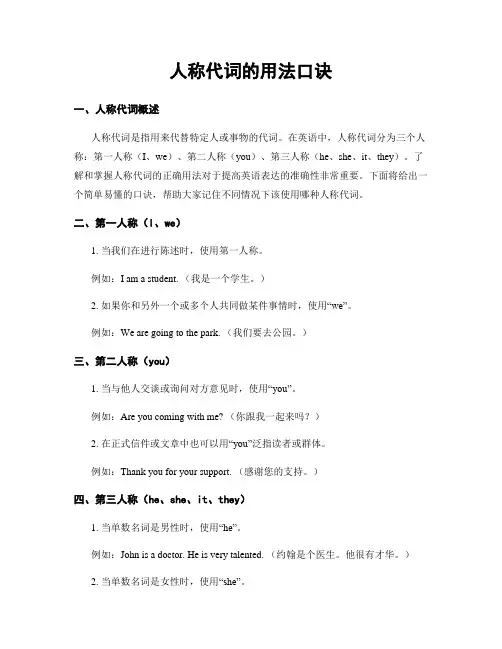
人称代词的用法口诀一、人称代词概述人称代词是指用来代替特定人或事物的代词。
在英语中,人称代词分为三个人称:第一人称(I、we)、第二人称(you)、第三人称(he、she、it、they)。
了解和掌握人称代词的正确用法对于提高英语表达的准确性非常重要。
下面将给出一个简单易懂的口诀,帮助大家记住不同情况下该使用哪种人称代词。
二、第一人称(I、we)1. 当我们在进行陈述时,使用第一人称。
例如:I am a student. (我是一个学生。
)2. 如果你和另外一个或多个人共同做某件事情时,使用“we”。
例如:We are going to the park. (我们要去公园。
)三、第二人称(you)1. 当与他人交谈或询问对方意见时,使用“you”。
例如:Are you coming with me? (你跟我一起来吗?)2. 在正式信件或文章中也可以用“you”泛指读者或群体。
例如:Thank you for your support. (感谢您的支持。
)四、第三人称(he、she、it、they)1. 当单数名词是男性时,使用“he”。
例如:John is a doctor. He is very talented. (约翰是个医生。
他很有才华。
)2. 当单数名词是女性时,使用“she”。
例如:Mary is a teacher. She loves her job. (玛丽是一名教师。
她热爱自己的工作。
)3. 当单数名词是中性或没有性别区分时,使用“it”。
例如:The cat is sleeping. It looks so cute.(猫正在睡觉。
它看起来很可爱。
)4. 当多个人或物体被代替时,使用“they”。
例如:The students are playing in the playground. They are having fun. (学生们正在操场上玩耍。
他们玩得很开心。
)五、特殊情况1. 在复合句中,人称代词的用法要根据主语的变化而变化。
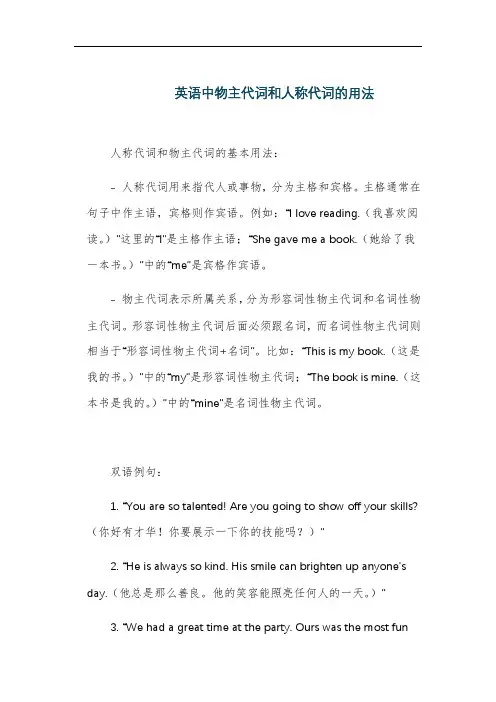
英语中物主代词和人称代词的用法人称代词和物主代词的基本用法:- 人称代词用来指代人或事物,分为主格和宾格。
主格通常在句子中作主语,宾格则作宾语。
例如:“I love reading.(我喜欢阅读。
)”这里的“I”是主格作主语;“She gave me a book.(她给了我一本书。
)”中的“me”是宾格作宾语。
- 物主代词表示所属关系,分为形容词性物主代词和名词性物主代词。
形容词性物主代词后面必须跟名词,而名词性物主代词则相当于“形容词性物主代词+名词”。
比如:“This is my b ook.(这是我的书。
)”中的“my”是形容词性物主代词;“The book is mine.(这本书是我的。
)”中的“mine”是名词性物主代词。
双语例句:1. “You are so talented! Are you going to show off your skills?(你好有才华!你要展示一下你的技能吗?)”2. “He is always so kind. His smile can brighten up anyone's day.(他总是那么善良。
他的笑容能照亮任何人的一天。
)”3. “We had a great time at the party. Ours was the most fungroup there.(我们在聚会上玩得很开心。
我们是那里最有趣的一群人。
)”4. “They are playing basketball. Their energy is contagious.(他们在打篮球。
他们的活力具有感染力。
)”5. “I can't find my pen. Where could it be?(我找不到我的钢笔了。
它会在哪里呢?)”6. “You look amazing today! Is that new shirt yours?(你今天看起来棒极了!那件新衬衫是你的吗?)”7. “He has a lot of books. Some of his are very interesting.(他有很多书。

主语人称代词及用法I 主语人称代词1.词形je ( I ) nous ( we )tu , vous ( you ) vous ( you )il (he / it ) ils ( they )elle (she / it ) elles ( they )2.用法如同英语中人称代词主格,用作主语。
1)tu 用作家人、好友间; vous(您)礼貌、尊重。
2)第三人称也可用作(它,它们)II冠词单数复数(阴阳同)阳性阴性定冠词 le, l’(the) la, l’(the) les (the)不定冠词 un (a/an) une (a/an) des (some /any)用法与英文冠词相同。
* 抽象名词前,一般用定冠词 Je n'aime pas le café.* 名词作表语,表身份、职业、国籍时,可省冠词 Je suis étudiant.* 定冠词le les前有介词à, de 时,要缩合 au(à + le) , aux (à + les), du ( de + le ) , des ( de + les )。
Nous allons au magasin.III名词1. 阴阳性人与动物的自然性别或固定用法 un étudiant/ une étudiante le frère/ la soe ur une valise mon bureau 某些行业无阴性,但可用于女性 un professeur2. 复数词尾加s 但不发音;un stylo/des stylos, une chaise/ des chaises;-s –x –z 单复数相同 un cours/ des cours;-eau, -au, -eu结尾复数加x 但不发音 un tableau/ des tableaux;-al结尾复数改为-aux un journal/ des journaux3. 种类月份、星期、语种在法语中不属于专用名词,词首不用大写 décembre, fran?aisIV动词变位法语按动词变位分为三组:第一组-er结尾;第二组-ir结尾;第三组-re, -oir, -ir结尾直陈式现在时(英语中的现在进行时和一般现在时)中,第一组动词变位如下:parlerje parle vous parleztu parles nous parlonsil parle ils parlentV一般疑问句1.陈述句型,语调上升 Vous parlez anglais?2.主谓倒置,中加- Etes-vous médecins?第三人称单数不以t, d结尾时 A-t-il un manuel de fran?ais?3.疑问词放前 Est-ce qu'elle a un manuel de fran?ais?GRAMMAIREI主有形容词1.词形单数复数(阴阳性相同)阳性阴性mon (my)livre ma (my)table mes (my)livres/tableston (your)livre ta (your)table tes(your) livres/tablesson (his/her/its)livre sa (his/her/its)table ses (his/her/its)livres/tables notre (our) livre/table nos (our)livres/tablesvotre (your)livre/table vos (your)livres/tablesleur (their)livre/table leurs (their)livres/tablesMa,ta,sa在元音开头或哑音h开头的阴性形容词前,由于读音关系,改成mon,ton,son。
英语人称代词用法口诀人称代词主宾格,作用不同莫用错。
主格动词前做主,动词介词后宾格。
You和it主宾同,其他主宾须分清。
人称代词并列现,尊重他人礼当先。
单数人称二三一,复数人称一二三。
若把错误责任担,第一人称我靠前。
英语人称代词是指直接指代人或者事物的代词。
在英语和汉语中都有三种人称代词,即:第一人称(我;我们),第二人称(你;你们),第三人称(他、她、它;他们、她们、它们)。
根据人称代词在句中所充当的成分可以分为主格人称代词、宾格人称代词。
另外,人称代词有单复数之分,特别是第二人称单复数写法都是一致的,实际翻译时应当注意。
英语人称代词表格用法:1.人称代词主格用来作主语,一般放在谓语动词之前。
例如:I am from China.我来自中国。
We are good friends.我们是好朋友。
He often plays basketball on the playground.他经常在操场上打篮球。
2.人称代词宾格用来作宾语,放在动词或介词的后面。
例如:Mr.Wang teaches us English.王老师教我们英语。
Let me help you.让我来帮你。
What’s wrong with him ?他怎么了?3.两个或两个以上的人称代词并列作主语时,排列顺序为:单数人称二、三、一,复数人称一、二、三。
例如:You ,she and I are good friends.我,你和她都是好朋友。
We,you and they all like music.我们,你们和他们都喜欢音乐。
4.当I与其他词语一起并列作主语时,I要放在后面,但承认错误时,I要放在前面。
例如:She and I are in the same school.她和我在同一个学校。
I and he make mistakes.我和他犯了错误。
用人称代词填空:1. This is my son. Please look after ________.2. These are my books. I put ________ on the desk.3. Tom, Tim and ______ (I) are good friends.4. She stands in front of ______ (I).5. You must find Daming and give these baseball cards to _________.6. She is new, I don’t know _________.7. Let ________ (I) help ________ (you).8. We can’t see ________ (he), but he can see ________(we).9. What’s Mike doing? He’s listening to _________ (she).10. We are playing games with ___________ (they).11. The girl is speaking to ___________ (he).12. Let you and _______ (I) be good friends.13. Those are my shoes. Please give _________ to ________ (I).14. __________ (we) are all students.答案:1.him2.them3.I4.me5.him6.her7.me, you8.him, us9.her 10.them 11.him 12.me 13.them, me 14.We。
英语人称代词的用法考试重点人称代词在英语语法中扮演着重要的角色。
熟练掌握人称代词的用法,不仅可以在日常交流中流利表达,还可以提高英语考试的成绩。
本文将重点讨论英语人称代词的用法,并给出相关例句进行说明。
一、主格代词(Subject Pronouns)主格代词通常用作句子的主语,用于代替特定的人或物。
以下是常见的主格代词:1. I(我)2. You(你/你们)3. He(他)4. She(她)5. It(它)6. We(我们)7. They(他们/她们/它们)例如:- I am a student.(我是学生。
)- You are my friend.(你是我的朋友。
)- She is a doctor.(她是一名医生。
)- We are going to the park.(我们要去公园。
)- They are playing soccer.(他们正在踢足球。
)二、宾格代词(Object Pronouns)宾格代词用作动词或介词的宾语。
以下是常见的宾格代词:1. Me(我)2. You(你/你们)3. Him(他)4. Her(她)5. It(它)6. Us(我们)7. Them(他们/她们/它们)例如:- John called me yesterday.(约翰昨天给我打电话了。
)- Can you help us with the homework?(你能帮我们做作业吗?)- I saw him at the supermarket.(我在超市看到他了。
)- She gave it to her sister.(她把它给了她的妹妹。
)- The teacher is talking to them.(老师正在和他们交谈。
)三、所有格代词(Possessive Pronouns)所有格代词表示所属关系,用于代替名词所有格或代名词所有格。
以下是常见的所有格代词:1. Mine(我的)2. Yours(你的)3. His(他的)4. Hers(她的)5. Its(它的)6. Ours(我们的)7. Theirs(他们的/她们的/它们的)例如:- Is this book yours?(这本书是你的吗?)- The red pen is mine.(那支红笔是我的。
英语人称代词和物主代词总结1.一般情况下,人称代词的主格作主语,放在句子的开头。
作主语,表示谁怎么样了、干什么了。
I am a teacher. 我是一名教师。
(I是主语)You are 11 years old. 你11岁了。
(You 是主语)He is my friend. 他是我的朋友。
(He是主语)It is hot today. 今天天气热。
(It是主语)2.宾格作宾语,通常放实义动词或介词的后面,表示动作行为的对象,如:动词let, like, help, give, ask 介词for, to, of, atCan you help me?你能帮我吗?(me是宾语)The cake is for you. 这个蛋糕是给你的。
(you是宾语)Give it to me(it me 都是宾语)注意点1.人称代词I无论放在句首、句中或句尾,都要大写。
2.人称代词she除了指女性“她”之外,还可以指祖国、月亮等拟人的东西。
如:I love my country. She is great.The moon is in the sky. She is round and bright.3.be 动词在人称代词后的使用:我是am 你是are is 连着他她它,其余复数都是Jim→he Kate→she Tom and Mike→they Lucy and I→ we人称的习惯顺序:如果有几个不同的人称同时作主语,且用and,or连接时,习惯顺序是:单数:you,he,and I 复数:we,you,and they但是,如果是做错事,承担责任时,有时,说话的人把I放在第一位。
Who broke the window?谁打碎了玻璃?I and Li Ming.我和李明.物主代词也有人称和数的变化。
通过观察上表,我们发现,除了my的名词性物主代词是mine, his和its的名词性和形容词性相同外,其他的名词性物主代词都是在对应的形容词性物主代词后面加“s”变成的。
2019中考英语代词用法:人称代词人称代词的用法1)人称代词的主格在句子中作主语或主语补语,例如:John waited a while but eventually he went home.约翰等了一会儿,最后他回家了。
John hoped the passenger would be Mary and indeed it was she.约翰希望那位乘客是玛丽,还真是她。
说明:在复合句中,如果主句和从句主语相同,代词主语要用在从句中,名词主语用在主句中,例如:When he arrived,John went straight to the bank.约翰一到就直接去银行了。
2)人称代词的宾格在句子中作宾语或介词宾语,但在口语中也能作主语补语,第一人称在省略句中,还可以作主语,例如:I saw her with them,at least,I thought it was her.我看到她和他们在一起,至少我认为是她。
(her做宾语,them做介词宾语,her做主语补语)a. —— Who broke the vase? ——谁打碎了花瓶?b. —— Me. ——我。
(me做主语补语= It’s me.)说明:在上面两例句中,her和me分别作主语补语。
现代英语中多用宾格,在正式文体中这里应为she和I.人称代词之主、宾格的替换1)宾格代替主格a.在简短对话中,当人称代词单独使用或在not 后,多用宾语。
---- I like English. --我喜欢英语。
---- Me too. --我也喜欢。
---- Have more wine? --再来点酒喝吗?---- Not me. --我可不要了。
b.在表示比较的非正式的文体中,常用宾格代替主格。
但如果比较状语的谓语保留,则主语只能用主格。
He is taller than I/me.He is taller than I am.2)主格代替宾格a. 在介词but,except 后,有时可用主格代替宾格。
英语中常用的人称代词和连词在英语中,人称代词和连词是常用的词汇,它们对于表达句子和段落的意义和结构至关重要。
下面是一些常用的人称代词和连词:
人称代词:
1.I(我):在句子中通常作为第一人称单数主格使用,表示说话者自己。
2.You(你):在句子中通常作为第二人称单数主格使用,表示听话者。
3.He(他):在句子中通常作为第三人称单数主格使用,表示男性。
4.She(她):在句子中通常作为第三人称单数主格使用,表示女性。
5.It(它):在句子中通常作为第三人称单数宾格使用,表示物体或事物。
6.We(我们):在句子中通常作为第一人称复数主格使用,表示说话者和他人。
7.You(你们):在句子中通常作为第二人称复数主格使用,表示听话者和他人。
8.They(他们):在句子中通常作为第三人称复数主格或宾格使用,表示多个人或事物。
连词:
1.And(和):用于连接两个或多个单词、短语或句子,表示它们之间是并列或添加关系。
2.But(但是):用于连接两个或多个单词、短语或句子,表示它们之间是转折关系。
3.Or(或者):用于连接两个或多个单词、短语或句子,表示它们之间是选择关系。
4.Because(因为):用于连接两个或多个单词、短语或句子,表示原因和结果关系。
5.Therefore(因此):用于连接两个或多个单词、短语或句子,表示推论和结论关系。
6.However(然而):用于连接两个或多个单词、短语或句子,表示转折关系。
英语人称代词的用法 代词的用法 作者:周刚 英语人称代词的用法 人称/物主/指示代词
分类: 英语中代词主要分为人称代词与物主代词、具体形式如下表所示:
第 一 人 称 第 二 人称 第 三 人 称 单数 复数 单数 复数 单 数 复数 人 称 代 词 主 格 I we you you he she it they
宾 格 me us you you him her it them 物 主 代 词 形容词性 my our your your his her its their 名词性 mine ours yours yours his hers its theirs I、 人称代词:人称代词又分为主格与宾格形式、主格通常做主语。宾格通常做动词或介词的宾语、 Eg: a、 I’m a nurse、 b. Could you help me ? c. Mum often takes us to the park on Sunday、 d. It’s a cat、 We call it “ Mimi、” e. Who knows him ? f. They are going to the cinema with her、
II、 物主代词又分为形容词性的物主代词与名词性的物主代词、 形容词性的物主代词:相当于形容词,后面要跟名词,指定名词的所属对象、 名词性的物主代词:相当于一个名词,必须单独使用,后面不能再跟名词、 Eg: a、 Your school is small, mine is big、(=my book) b、 This is not your pen、 Yours is on the desk、(=your pen) c、 whose book is that ? It’s hers、 (=her book) d、 Their classroom is on the second floor、 Ours is on the third floor、(=our classroom) e、 Her bike is black、 His is grey、 Mine is blue、(=his bike, my bike) f、Those aren’t our books、 Ours are on the floor、 Those books are their、(=our /their books ) 英语人称代词的用法 *人称代词划线,常用who (宾格可用whom)提问、物主代词划线常用whose提问。 (特别提示): 并列人称代词的排列顺序 1)单数人称代词并列作主语时,其顺序为: 第二人称 -------第三人称 --------第一人称 you ------- he/she/it -------- I eg: You,he and I should return on time、 2)复数人称代词作主语时,其顺序为: 第一人称 ------- 第二人称 -------第三人称 We------you---------They
III、指示代词: this 这个, that 那个 these这些 those那些 EX I : 用所给代词的正确形式填空、 1. _____I_____am a monkey、 Do you like __it_______? _______My___name Gogo、 This house is _______us_______、 (I ) 2. The teacher ask __me________some questions, but ____I____can’t answer、 (we)、 3. The girl is from Canada、 ___Her______name is Betty、 The man is _____her__father 、 we like __them______very much、 (she) 4. Are these _____your_______(you) things ? NO, they are _____their____( she)、 5. Daming’s bag is blue、 This yellow one isn’t _____his_______、 (he) 6. Don’t thank ____me______(I ) , thank _____him______(he), 7. ____They___names are Lucy and Lily、 ___They___are from the USA、 ____They______live in China with ____their______parents not、 (they) 8. This is Liu Ming’s dog、 __Its______name is Cody、 Liu Ming likes ___it____very much、 He often takes ___it_____to the street、 9. __we____are students、 ____Our______school is No、 2 Middle School、 ___We_____have eight classes every day、 This classroom is ___ours________、 The teachers are very kind to __ours___________、(we)
10、_________is our English teacher、 We call _________Miss Smith、
_________daughter is very lovely、 We like ________lessons very much、 (she) 10. The man is English、 _________name is John Brown、 The people call __________Mr、 Brown、 _________works in Beijing now、 11. This isn’t __________coat、 ___________is purple、 ( I )、 12. ----Is this_______________(you) pencil ? 英语人称代词的用法 ----No、 It’s not __________(I ) 、 I think it’s ___________(she )、 13. Look at _________、 What’s in ___________hands ? (he)、 14. Whose desks are those ? __________are _____________/ (they ) 15. ___________( I ) English teacher is a man、 __________(he) is a woman、 16. There are three people in Li Lei’s family、 __________are ___________parents and ___________、 ________has a very happy family、 17. _________father and mother look after ____________、 (I ) 18. That’s not ___________chair、 ___________is over there、 ( you) 19. __________(we) are in Class One、 ___________(they ) are in Class Two、 __________(we) classroom is bigger than ___________(they)、 _________(we) often play basketball with _____________(they )、 20. She is a friend of ____________(I )、 I often go shopping with _________(she)、 _______(she) house is next to ______________(I )、 21. There is a shop near ___________school、 The people in the shop are very friendly to ____________、 _______often bus school thing there、 (we) 22. That’s very kind of ________、 Thank ______for __________help、 (you) 23. __________(I ) computer is broken、 What about _____________(you)? 24. _________(she) parents are teachers、 __________(I ) are workers、 25. This pencil is not __________、 ___________is at home、 26. The twins are from India、 _________parents are doctors、 _________go to school by bike、 These two bikes are ____________、 27. I’ve got a good friend、 ________is a girl、 ______name is Sally、 _________mother is an English teacher、 We like _________very much、 28. What’s this ? ________is a bird、 _______name is Polly、 29. _________are going to see a film 、 would you like to go with ________? (we) 30. _______(she) father works in a hotel、 _____(he) works in a university、 31. Whose Chinese book is this ? It’s ________、 _________forget to have it、 (I ) 32. Yao Ming is a basketball star、 ________is from Shanghai、 _________is in the USA now、 Many Chinese and American people like ___________、 33. The woman is English、 Do you know ____________? 34. I’m a student of ______________(he)、 35. That’s isn’t ___________(you) watch、 It’s _________(she) 36. _____(I ) father is a teacher、 I often ask ________questions、 37. Maths is very hard to _______、 ______doesn’t know how to study、 (she)、 38. This is _______(she) bag、 It’s older than ____________(he)、 39. ----Would you like to go with ________(we) or _________(they)? ----- I’ll go with _________(you)、 Ex II: 句型转换、